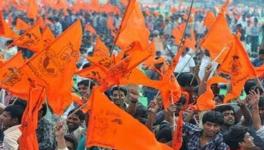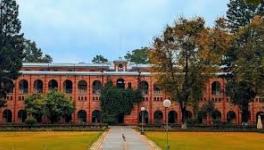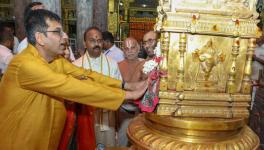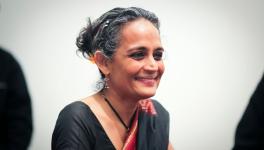UP Elections: Temple at Altar of Communal Peace Unacceptable, Say Mathura Residents

Mathura (Uttar Pradesh): The Bharatiya Janata Party (BJP) has opened the Mathura chapter of its Hindutva syllabus, with its leaders promising construction of a “grand temple” in the Krishna Janmabhoomi complex that also houses the Shahi Idgah Masjid, but local residents in the holy city say that a magnificent temple already exists at the birth place of Lord Krishna and that they don’t want any other temple there at the cost of communal harmony in the region.
Some residents also feel that the matter is sub judice in a Mathura court, so let the judiciary decide. They claim “it is not at all a subject of discussion in the district” and they won’t allow it to become a poll issue.
“There is no dispute at all among people living here. Mathura is a sacred place, and people live here in complete harmony. There is neither any threat to the mosque nor the temple. A mountain is being made out of a molehill,” Pavan Chaturvedi, who owns an automobile showroom at Mathura-Delhi road, tells NewsClick, adding that “there has been instigation” but locals did not pay heed.
It all started after a Right-wing outfit, Akhil Bharat Hindu Mahasabha, announced that it would install a Lord Krishna idol at the deity’s “actual birthplace”, which it claims is in the Shahi Idgah mosque. Following the announcement, the Mathura district administration imposed prohibitory orders under Section 144 of the CrPC and managed to maintain peace and tranquility.
The Hindutva groups also moved local courts in September 2020, seeking the installation of a Krishna idol in the Aurangzeb-era mosque. Claiming that “every inch of the structure” is sacred to the Hindu community, they described the settlement reached between the Krishna Janmabhoomi Sewa Sangh and Shahi Idgah Trust in 1968 as “illegal”. But the petition was rejected by the Additional District Judge on the issue of maintainability.
The petitioners then filed an appeal in the court of the district judge where the matter is pending.
An application was filed in April last year, seeking that the Archaeological Survey of India should conduct a survey into the mosque. One more application was filed in December, seeking to stop namaaz (prayer) in the 17th century mosque because some Hindu symbols are inscribed on one of its walls adjoining the temple.
Wasting no time to use this opportunity apparently for electoral gains, leader after leader belonging to the ruling BJP began making statements, stoking up a controversy.
In December last year, Uttar Pradesh Chief Minister Yogi Adityanath said that magnificent temples were being built in Ayodhya and Kashi, so how can Mathura-Vrindavan be left behind.
BJP parliamentarian Hema Malini, too, had said last month that Mathura, her Lok Sabha constituency, would also get a grant temple along the lines of Ram temple in Ayodhya and Kashi Vishwanath temple in Varanasi.
“There should be a grand temple in Mathura, which is the birthplace of Lord Krishan who is a symbol of love and affection,” the actor-turned-politician had said at an event at Indore in Madhya Pradesh.
“A temple is already there and can be beautified, like Modi ji (Prime Minister Narendra Modi) developed Kashi Vishwanath corridor, and the river Ganga can be seen directly from the temple,” she had added.
Before Hema Malini, Uttar Pradesh’s Deputy Chief Minister Keshav Prasad Maurya had stirred the cauldron of religious polarisation on December 1, by making a remark that seemed to suggest that the ruling BJP is “preparing” for a grand temple in Mathura.
UP’s Dairy Development, Animal Husbandry and Fisheries Minister Laxmi Narayan Chaudhary, who belongs to Mathura, made a similar remark when he advocated construction of a new temple or expansion of the existing Mathura temple.
“If the Krishna temple is not built in Mathura, will it be built in Lahore?” he had said.
But the real stakeholders, the city residents, seem to be unfazed by such statements.
“The interesting aspect of that event was that following the call for installation of a Krishna idol in the mosque after ‘maha jalabhishek’ to ‘purify’ the place on December 6 to reclaim it, only five people gathered at Gate 1 of the Krishna Janmasthan complex, and none of them were from Mathura. They all were taken into custody,” said advocate Madhuvan Dutt Chaturvedi.
This is not a communal issue here because Mughal emperor Aurangzeb, who had got the Idgah mosque constructed, had also got naqquashi (carving) done on the Dauji Maharaj temple (the birthplace of Balram– the elder brother of Lord Krishna). He had also donated five villages as jagir (manor) to the temple, he said.
“The Krishna Janmasthan is not a symbol of faith of the Vaishnav community (followers of Vishnu and his avatars, like Krishna) of Mathura. It can be a tourist destination. The Vishram Ghat, the Dwarkadhish Temple in Vrindavan, Radhika Mandir and Nand Bhawan are their holiest temples. As the petition was filed in the district court, the Mathura Chaturved Parishad (a group representing the Panda Samaj or priest community) too has appealed in the court of the district judge that they should also be heard in the matter as a party. They told the court they want status quo on the non-existence of the temple and the mosque, as interfering in it will impact communal amity in the region,” said Chaturvedi.
After the first petition was filed in the matter, several other litigants have filed the same suit in the court.
As the controversy was raked by the Hindutva outfits, the Brahmin Mahasabha, Akhada Parishad and Dirgh Vishnu Mahant vehemently opposed it and issued a statement, appealing to people to maintain peace and harmony.
Even those who reside in the Krishna Janmasthan complex had similar views.
“Both religious places are different and separate entities. An unnecessary controversy is being stoked to create a communal atmosphere in the district. Hindus and Muslims co-exist here. They have mutual business interests. Muslims here make ornaments, dresses and crown of Lord Krishna and Radha and it is a big business here. So, there is no conflict,” Rajendra Singh Sisodia told Newsclick.
Recalling the incident of December 6, Sisodia said only three people came here who were welcomed by the temple managing committee and were politely asked to leave. Instead of going back peacefully, they tried to create a ruckus, which was opposed by the committee and the locals. “They could have been thrashed had the administration not intervened and taken them in custody,” he said.
Even the other litigants who later filed separate suits seeking removal of the mosque distanced themselves from the call given for the December 6 event.
“We want removal of the mosque but at the same time, communal harmony should not be allowed to get disturbed at any cost. What happened that day (December 6) might be a political stunt for some. Therefore, we did not support the event. We have faith in the judiciary,” said advocate Rajendra Maheshwari, who is representing the five plaintiffs – Thakur Keshavdev (the deity), the United Hindu Front through Jai Bhagwan Goyal, Dharm Raksha Sangh through Saurav Gaur, Rajendra Maheshra (the lawyer himself) and Advocate Mahendra Pratap Singh.
The managing committee of the Shahi Masjid Eidgah, through its secretary, UP Sunni Central Waqf Board, Shri Krishna Janmabhoomi Trust and Shri Krishna Janmasthan Seva Sangh, are defendants in the case.
The Krishna Janmasthan complex is spread over an area of 13.37 acres and it is owned by Thakur Keshavdev ji (the deity). The temple is run and managed by the Shri Krishna Janmabhoomi Trust through a managing committee. The mosque stands on an area of around one acre.
“Our argument is that the trust did not reach the agreement (which was agreed upon and decreed in 1968), but the managing committee of the trust did so. The land in question belongs to the temple. So the devotees (the Hindu community) have right over it. And therefore, we have approached the court,” he explained.
Asked about the Places of Worship (Special Provisions) Act, 1991, which prohibits conversion of any place of worship and to provide for the maintenance of the religious character of any place of worship, as it existed on August 15, 1947 (the law, however, exempted litigation on the ownership over Ram Janmabhoomi-Babri Masjid dispute), Maheshwari said: “The legislation does not apply in our case. It is not an embargo and obstacle on maintainability and proceedings of this case. The invaders demolished our religious structures and symbols with an intention to root our existence. Now, the time has come to remove the symbols of religious suppressions. Simply ignoring it and wanting a status quo in the name of communal harmony is not justified.”
There are two sides of a coin, he said, adding that talking about reclaiming the place might be a political stunt for some but it can be a matter of aastha and swabhiman (faith and self-respect) for a vast majority.
Harnath Yadav, Rajya Sabha MP from Uttar Pradesh, recently demanded repeal of the Act. A petition in this regard is also pending in the Supreme Court.
Professor Zaheer Hasan, president of the Shahi Eidgah mosque, refused to talk on the merit of the case, saying that the committee will present its arguments before the court. But the proceedings, he claimed, will not have any impact on Hindu-Muslim brotherhood.
“There is a strange integration between the two communities here. Those who are trying to capitalise on a non-issue will not ever succeed,” he added.
Sharfuddin Khan, 70, who has been making beautiful mukuts (crown) for Lord Krishna for the past 40 years, said he has inherited this art form from his ancestors.
“We have been doing this for generations. We make mukuts, ornaments and zari embroidery for Lord Krishna and Radha. We get no time during Janamashtami. Our customers are Hindus. So in a way, we contribute to their faith and rituals. Attempts are being made to disturb this fabric, but this is Mathura where politics of hatred has never succeeded,” Khan added.
Muslims constitute 15-17% of the population in the city and form a large section of workforce involved in the business. “Not less than 40% of the workforce engaged in the business of making headgear, dresses and rosaries used to decorate and worship Lord Krishna are Muslims. Nobody raised a fuss when the Supreme Court delivered the Ram Janmabhoomi verdict. The past cannot be restored, the best is to salvage the present and build a better future,” said Pundit Kameshwar Nath Chaturvedi.
So far, residents of Mathura city have successfully warded off all attempts by Hindutva organisations to polarise the people on religious lines, yet some are apprehensive over how long they will be able to do so.
Notably, the sacred city, which is close to the national capital of Delhi, did not witness communal flare-ups even during the Ram Janmabhoomi movement in 1991-1992 that had spread communal poison across almost the entire country.
Get the latest reports & analysis with people's perspective on Protests, movements & deep analytical videos, discussions of the current affairs in your Telegram app. Subscribe to NewsClick's Telegram channel & get Real-Time updates on stories, as they get published on our website.
























